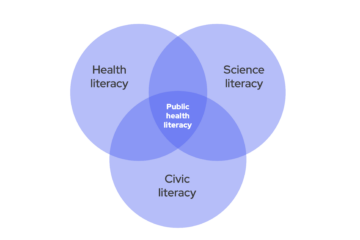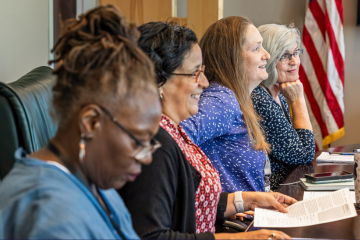
Dr. Levine visits a lake in Germany, gaining some regeneration by spending time in nature
Here is a question for you to ponder: Is it possible that the governmental public health workforce could actually be better off because of the pandemic?
Such a question forces us to go beyond the concept of resilience, which is about getting back to where we were before the pandemic, and into something even better – antifragility, a concept explained in this video by Nassim Nicholas Taleb; and regeneration, “to bring into renewed existence” or “bring new and vigorous life.”
Right now in governmental public health, where we find a traumatized workforce in a time of great upheaval, we need to find an affirmative answer to the question above. These times represent great opportunity, but only if approached with a positive, strength-based, growth mindset — an important attitude for leaders in public health.
Perhaps, an approach that focuses on the positives, including the assets we bring to bear; the opportunities presented; and our aspirations for the future of public health and its workforce is the best way to move us toward developing an antifragile public health workforce.
During my time in public health leadership, I personally found it very easy to only focus on the problems, which directed me into a negative space. We were always focusing on putting out the fire of the day, so that was our standard approach. That mindset led to looking at data mostly from a deficit perspective: the data that tells us what is wrong or inadequate. Fortunately, because I had some awareness of the power of the positive, I worked hard to avoid being pulled in the opposite direction. In retrospect, I realized that I had a strong foundation of self, practiced a growth mindset, and was in fact antifragile.
What we can learn from PH WINS?
The usual approach to analyzing the Public Health Workforce Information and Needs Survey (PH WINS) data is through a deficit lens. But what do we see if we take an appreciative approach to such inquiry — an asset-oriented approach that seeks insight into what is working well — and focus on the factors related to people who stay in governmental public health positions? There are, of course, many factors that are specific to individuals. However, taken together, we see the importance of the following issues in determining our likelihood of staying. They include having:
- meaningful work
- a positive relationship with supervisor
- a supportive and encouraging organizational culture
These are not new findings with the most recent PH WINS data, but recurring themes over many years of the survey. An appreciative perspective brings to the forefront at least two critical opportunities for leaders seeking to create the conditions in which all can thrive: the very definition of a regenerative approach to leadership.
What can we do now?
First is to gain a basic understanding and appreciation of well-being and its two key components, eudemonia and hedonia. Eudemonic well being refers to factors that give us purpose and meaning in life, and they are critical for sustaining well-being, whereas hedonic (pleasurable) well-being factors are generally more fleeting although still important. By definition, public health work is meaningful and purposeful. Therefore, we already start from a place of strength from which to build.
Second is to value the development and maintenance of generative relationships, those where the connection benefits both parties, particularly between supervisor and supervisee. When relationships are generative, we see the emergence of mutual respect, trust, ability to disagree for the betterment of the public’s health, and a sense of support for the career development of the supervisee.
This relationship is a critical stay factor! It creates the important sense of belonging that Brene Brown notes is an “irreducible need for all people.” We are living, social beings and not machines, so our public health workforce can only ‘belong’ if we as leaders value those generative relationships. Brown’s quote, “We have to belong to ourselves as much as we need to belong to others. Any belonging that asks us to betray ourselves is not true belonging”, captures the essence of belonging.
Can the public health workforce be antifragile after all that has happened? Absolutely, if we lead with the wonderful assets that make up our whole living being, rise above the machine metaphors that have guided our thinking, and value the generative relationships that are so critical to our well-being. The world is constantly changing and we must be agile enough to adapt and thrive. After all, that is what regeneration is all about.
Guest post by Marissa J. Levine, MD, MPH, FAAFP, University of South Florida College of Public Health




